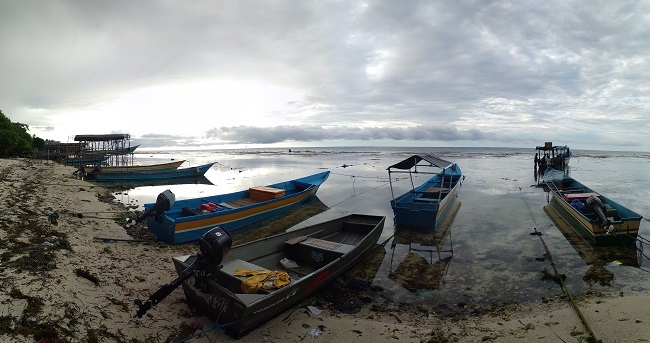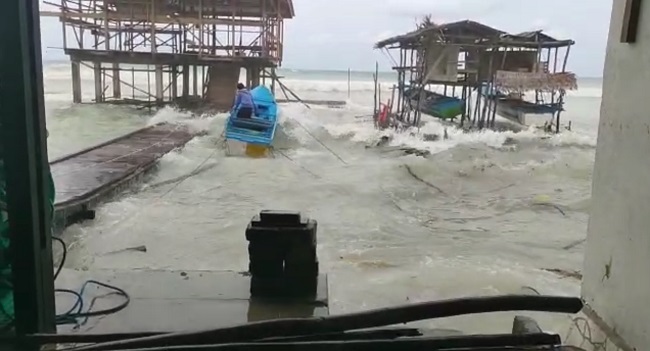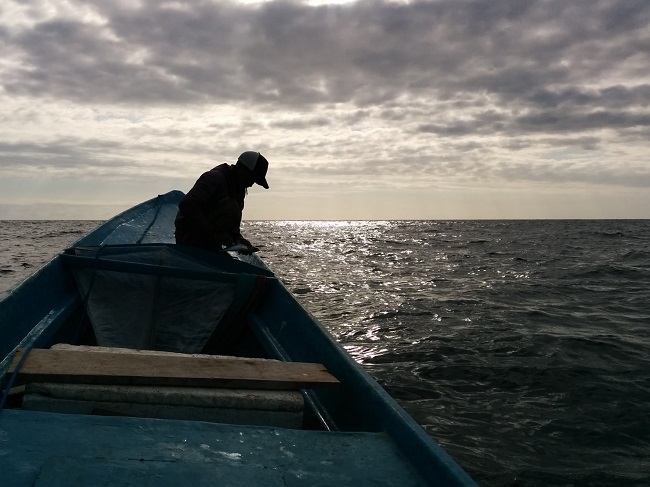Geger Riyanto
It was June 2019 and I was visiting my foster family. They are fish traders in Parigi a coastal settlement in North Seram, central Maluku. They almost never openly complained about financial difficulties. It could be because such things are humiliating and not supposed to be shown to others. Life, however, also used to be good for them. Yellowfin tuna was Parigi’s main commodity and the fish used to be in abundance.
As I chatted with Wa Ida, my foster mother, she suddenly asked if she still had to pay for her daughter’s college admission fee, since she had already passed the entrance examination. Wa Ida was under the impression that those who passed such a test did not need to pay for their education, especially since her daughter had been invited by the college to take it. ‘Yes. That is actually common’, I answered. ‘How can we pay the admission fee?’, she bemoaned, ‘No fish are being stored with us these days’.
This response was not something I had anticipated from her, but it soon became clear that times were indeed unexpectedly difficult. A few years ago, La Yamin, my foster father, could collect between 500-800 kilograms of yellowfin tuna loins a day. On a busy day, around eight to twelve fishermen would come to sell their catches to him. These fishermen roamed the sea from dawn in their small outboard motor boats, employing artisanal fishing methods. Each could bring back up to seven yellowfin tuna in the afternoon.
Now, a month had passed without any fisherman selling their catch to La Yamin. The situation was no better for other fish traders or for the fishermen themselves. Fish were scarce. Fishermen were hesitant to go fishing since returning without any catch meant they had incurred a loss due to the cost of fuel. The men of the village spent their time at home or tried to find work elsewhere. Some still tried their luck and went fishing, only to return empty-handed, discouraging others from doing the same.
Of course, things were not always as bleak. A few months earlier, Parigi fishermen had still been busy. La Yamin still had people selling their catches to him on a daily basis. However, they had been considerably smaller than before.
Vulnerable livelihoods
Climate change has led to rising ocean temperatures. This has been noted to affect fish populations all over the globe. When I first came to Parigi in 2015 fishermen caught yellowfin tuna using a method they called layang-layang, or kites. In the middle of the sea, they flew a kite with a bait of mock flying fish dangling down from it and resting on the water. When the fishermen tugged on the kite string, the bait twitched and jumped like a flying fish, arousing the tuna’s interest.

Later it became increasingly difficult for them to catch yellowfin with layang-layang. They changed their fishing method. They dropped a bait of squid attached to a hook to the bottom of the water and waited for the fish to take it. This suggested that, aside from being scarcer, yellowfin tuna now swam deeper. This might very well be related to changes in the zooplankton’s population on the ocean surface caused by warming temperatures.
Nevertheless, climate change was something intangible for Parigi villagers. Amid the notable drop in their catches, the Parigi fishermen made new fish traps. This is a bamboo raft with coconut leaves tied into it and anchored tens of kilometers out to sea. The coconut leaves attract plankton and this, in turn, lures fish. Such a fish trap is not easy to make. It requires weeks of communal work as well as a considerable amount of cash. People consider a fish trap their ‘collective savings’ (tabungan bersama). Investing their labour and money in it is an obligation.
‘I hope the fish will come again after the new fish traps are set,’ La Yamin remarked to me. But I could not help but wonder if what they did would really change things for the better. After returning from my fieldwork, I heard that they had successfully started to catch tuna this way, but the catch could not compare with what it had been.
What happened to the Parigi villagers is not exceptional. Fishermen around the Malukan archipelago are experiencing a sudden drop in their catches. From the fishermen of other villages in North Seram to those who live in Ternate, they cannot catch as much as they used to. They have to travel further out to sea. This increases the financial risk to them, especially if they return without any catch at all. Like the Parigi villagers they cannot pinpoint the particular cause of their predicament.
‘What is [the cause of] this phenomenon?’ Gafur Kaboli, a fisherman in Jambula, Ternate, asked the Mongabay environmental news site. ‘Are the fish resources in decline? Too many people? New varieties of fishing technologies?’
The last few years were the hottest on record and it will only get warmer. The relationship between this and the change in fish stocks, however, is not yet something the fishermen have grasped. One of my friends in Parigi denied that the shortage of fish was unprecedented. ‘There are times when fish are scarce,’ he said. He expected things to get better by themselves, as they had done in the past. All they needed was patience.
Intangible crisis
What makes climate change such an unprecedented threat is its ubiquity. Everyone and everything on the globe will be affected by it. This, however, renders it elusive. It will manifest itself in distinct ways in different places. What is apparent and felt are largely these local effects. But this merely ensures that people are unable to grasp that they are on the brink of an irreversible danger, along with every other being on the planet. It does not help that climate literacy is generally low in Indonesia. Both the people and the government think the conventional economy (as measured by GDP) is of more importance.
Indonesian NGO workers and climate activists have admitted that they struggle with this situation. In their endeavours to communicate the science of climate change, they have a hard time keeping the issue afloat among other ‘more concrete’ issues. Whether it is in their campaigns on mainstream and social media, or among local communities, their audiences think the issue is too abstract. They need to ground it in something more tangible.
As such, the very first thing they do in their campaigns is to find local problems through which they may anchor the intangible phenomenon. The Indonesian Forum for the Environment (WALHI) does this by prompting communities to ruminate on ecological problems that concern them the most, and then connecting these with climate change. Greenpeace Indonesia, in one of its most successful climate change campaigns, associates the problem of pollution that has perpetually plagued Jakartans with the global ecological crisis.
A lack of connection between global science and everyday experience is also likely to be the case among the fishermen of Maluku. The idea of climate change is foreign to them, even while as communities predominantly settled along the coasts they are the first to notice its effects. Not only their livelihoods are threatened by the warming temperatures, but they may also lose their land and their homes in the warmer future. When I asked my foster family if they noticed the sea level was rising they simply said that the sea surface had risen higher in the 1990s, when it reached their houses, and that it was better now. They were probably referring to a time when an anomalous climate event like La Nina had caused more stormy weather. Lacking an understanding of climate change, they used this example to suggest that similar climate events were not irreversible.
Anchoring the intangible
Even with such a challenge, it is not impossible to prompt Malukan coastal communities to act against climate change. Grassroots learning initiatives remain immensely valuable. From the dramatic fish scarcity to their settlements’ potential drowning, there are a multitude of markers to anchor the global crisis to people’s everyday realities.
In February 2022, a storm surge hit the coast of North Seram. Everyone in Parigi was shocked. Its tidal waves hurled docked boats around and wrecked boat houses. The following night, Parigi villagers, terrified that another surge might hit, chose to sleep in an emergency tent on higher ground. As such unprecedented disasters start to become coastal settlers’ everyday reality, people have in their hands the very experience to anchor climate crisis.

Moreover, the coastal settlers of Maluku are capable of acting together. The fish traps are only one example of what they can do when called on to produce something for the common good. People have to be available when one among them needs their labour, such as to lay the foundations for a house. When the storm surge hit Parigi, people only thought of how they could help the others.
The coastal settlers’ subtler ecological framework should also be mentioned. Parigi has a tradition of presenting offerings to the sea. Money, cigarettes, and betel are put into a small container of banana leaves. These are cast into the sea when, for example, releasing a new fish trap. As my foster father was preparing such an offering, my foster mother told me about the time villagers spent days looking for a body in the sea. The unfortunate child of a Parigi fisherman had drowned while playing on the shore. ‘After we cast the offerings, the body was found,’ she said. ‘The sea stopped being angry.’ The offerings calmed the powerful spirit of the sea. Villagers carry on the practice to address various predicaments.
This illustrates that people in Parigi attribute predicaments to an upset ecological balance. They respond immediately by attempting to restore that balance. This is not an uncommon cultural inclination. Parigi shares it with other Malukan coastal communities. It is probably part of a much older Austronesian ecological framework. What if we start to associate the sea that is at unrest with the constant warming of the world? What if Maluku villagers are made aware that the balance is universally disturbed, and that it can be addressed if they partake along with every other community in common action to restore it?
Geger Riyanto (geger255@gmail.com) is a PhD student in Heidelberg, Germany. He also wrote the accompanying photo essay on the fishing community in Parigi.
